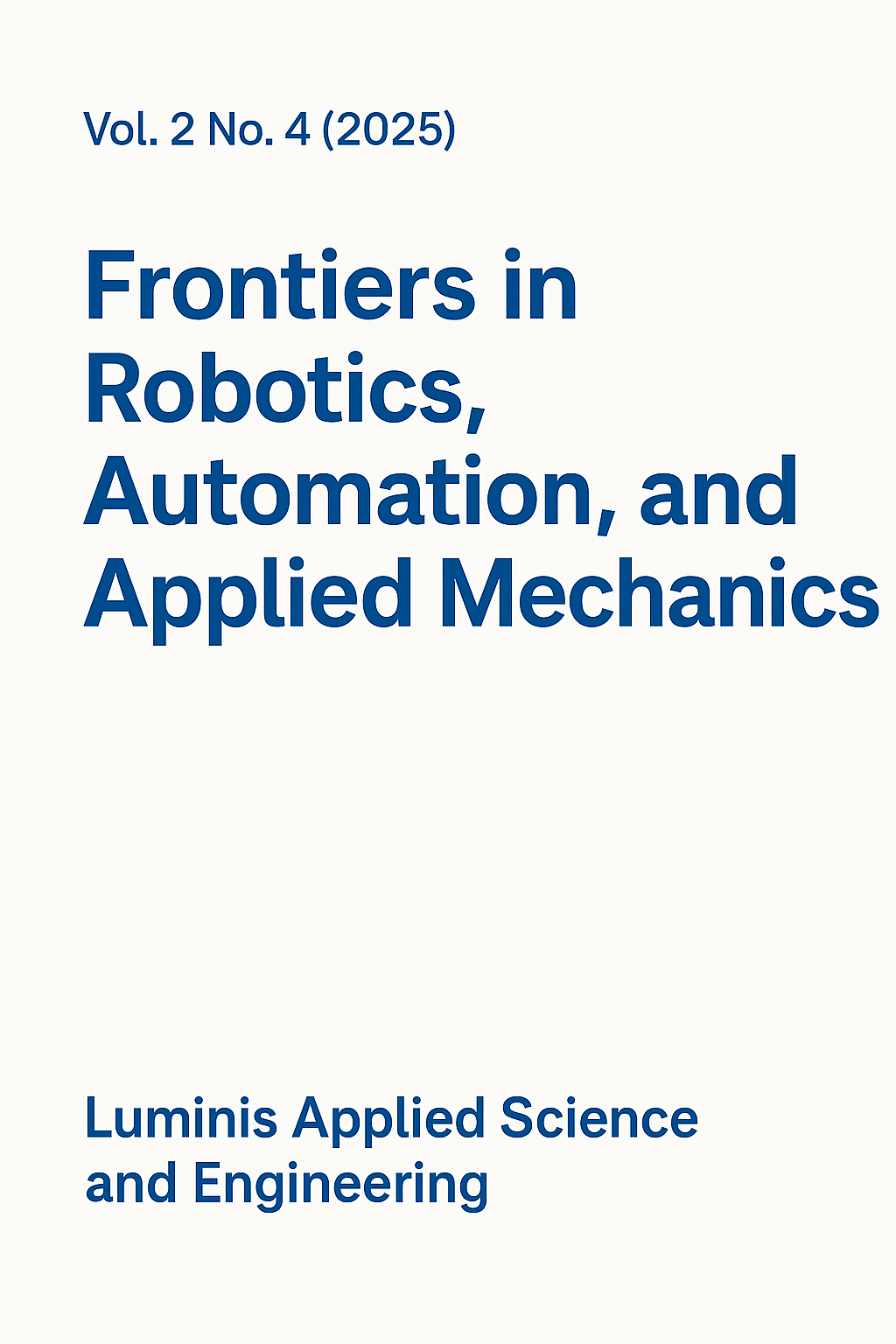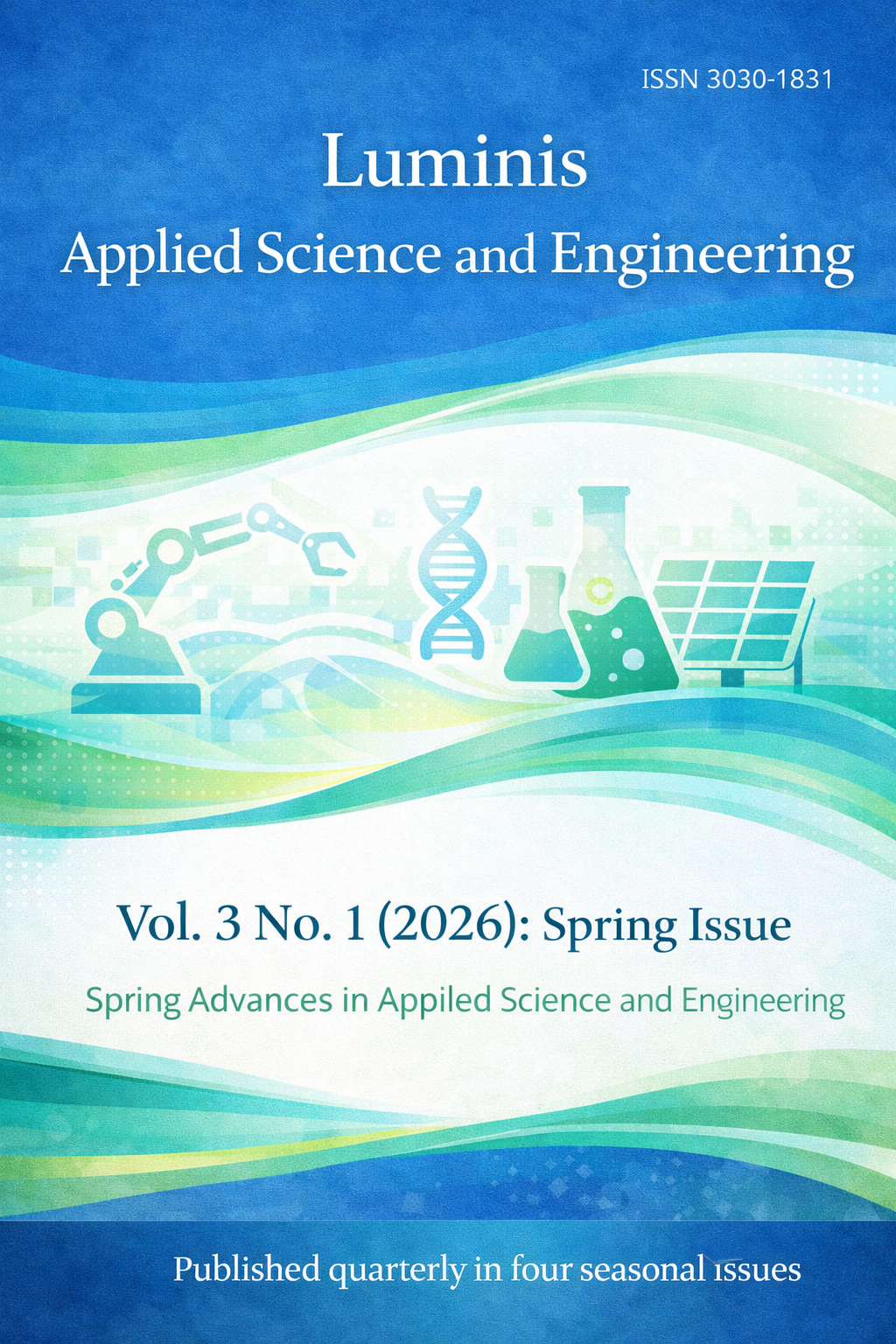Archives
-

Engineering Intelligence: Data, Design, and Discovery
Vol. 2 No. 2 (2025)This issue of Luminis Applied Science and Engineering (Vol. 2, No. 2) presents a curated selection of cutting-edge research and practical applications at the crossroads of technology, data science, and engineering innovation. Contributions explore the integration of artificial intelligence, smart systems, digital management, renewable energy, robotics, and advanced materials across disciplines. Emphasizing interdisciplinary approaches, this volume reflects the ongoing transformation of applied sciences toward smarter, more connected, and more sustainable solutions for global challenges.
-

Frontiers in Robotics, Automation, and Applied Mechanics
Vol. 2 No. 4 (2025)This issue of Luminis Applied Science and Engineering is dedicated to exploring the transformative role of robotics, automation, and applied mechanics in shaping modern engineering and technology. As industries increasingly embrace intelligent systems and advanced mechanical solutions, the convergence of these fields is redefining efficiency, precision, and innovation.
We invite original research articles, review papers, case studies, and technical reports addressing (but not limited to) the following themes:
-
Robotics and Intelligent Systems: autonomous robots, human-robot interaction, industrial robotics, soft robotics.
-
Automation and Control Systems: smart manufacturing, cyber-physical systems, industrial IoT, adaptive control methods.
-
Applied Mechanics: structural mechanics, fluid dynamics, tribology, dynamics of mechanical systems.
-
Simulation and Modeling: computational mechanics, digital twins, finite element methods, predictive modeling.
-
Applications Across Industries: healthcare robotics, aerospace automation, sustainable engineering solutions, energy systems.
The issue aims to provide a platform for researchers, engineers, and practitioners to present cutting-edge findings that advance both theory and application in these critical domains.
-
-

Inaugural Issue.
Vol. 1 No. 1 (2024)The inaugural issue of Luminis Applied Science and Engineering (ISSN: 3030-1831) showcases groundbreaking research and innovative methodologies in the fields of applied sciences and engineering. This issue emphasizes interdisciplinary studies, novel applications, and emerging trends to contribute to the global discourse in these domains.
-

Prīma editio
Vol. 2 No. 1 (2025)Interdisciplinary Advances in AI, Science, and Engineering
This issue explores the intersection of artificial intelligence, engineering, and science, fostering collaboration between diverse disciplines such as computer science, materials engineering, and environmental studies. Topics include AI-driven solutions to real-world engineering problems, case studies of interdisciplinary innovations, and emerging technologies shaping the future of engineering and AI integration. -

Sustainable Frontiers: Green Technologies and Future Systems
Vol. 2 No. 3 (2025)This forthcoming issue of Luminis Applied Science and Engineering invites contributions that address the growing need for sustainable, efficient, and intelligent solutions across scientific and engineering domains. Titled Sustainable Frontiers: Green Technologies and Future Systems, this volume will focus on innovations in:
Renewable energy systems
Environmental engineering
Green materials and nanotechnology
Waste reduction and water purification
Smart agriculture
Sustainable urban planning
Circular economy modeling
AI applications for climate monitoring
We welcome original research articles, systematic reviews, applied project reports, and interdisciplinary case studies that aim to shape a more sustainable technological future.
Call for Papers: Open
Planned Publication: 2025-07-17
Volume: 2 | Issue: 3 | ISSN: 3000-1391 -

Spring
Vol. 3 No. 1 (2026)The Spring Issue opens the third volume of Luminis Applied Science and Engineering and presents peer-reviewed research highlighting emerging trends, innovative methodologies, and foundational developments in applied science, engineering, and computing. This issue emphasizes interdisciplinary research and early-stage technological advancements.
-

Interdisciplinary Approaches in Modern Engineering
Vol. 1 No. 2 (2024)This special issue of Luminis Applied Science and Engineering (ISSN: 3030-1831) focuses on the dynamic intersection of disciplines within the engineering field. As the complexity of modern challenges grows, solutions often emerge from the collaboration of diverse fields such as computer science, materials engineering, environmental science, and beyond.
This issue invites contributions that highlight:
- Collaborative research addressing real-world engineering problems.
- Case studies showcasing interdisciplinary innovations.
- Reviews of emerging technologies blending multiple engineering domains.
- Explorations of the societal impact of interdisciplinary engineering.
By fostering a dialogue between fields, this issue aims to push the boundaries of knowledge and practice in engineering, emphasizing creativity and integration as keys to advancement.



